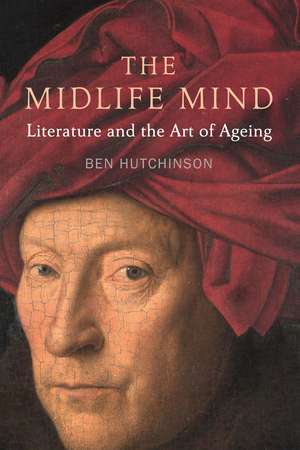The Midlife Mind: Literature and the Art of Ageing
Autor Ben Hutchinsonen Limba Engleză Hardback – 22 dec 2020
Preț: 158.80 lei
Preț vechi: 170.06 lei
-7% Nou
Puncte Express: 238
Preț estimativ în valută:
30.39€ • 31.61$ • 25.09£
30.39€ • 31.61$ • 25.09£
Carte disponibilă
Livrare economică 24-31 martie
Livrare express 08-14 martie pentru 47.56 lei
Preluare comenzi: 021 569.72.76
Specificații
ISBN-13: 9781789143508
ISBN-10: 1789143500
Pagini: 328
Ilustrații: 20 halftones
Dimensiuni: 159 x 235 x 28 mm
Greutate: 0.6 kg
Ediția:Nouă
Editura: REAKTION BOOKS
Colecția Reaktion Books
ISBN-10: 1789143500
Pagini: 328
Ilustrații: 20 halftones
Dimensiuni: 159 x 235 x 28 mm
Greutate: 0.6 kg
Ediția:Nouă
Editura: REAKTION BOOKS
Colecția Reaktion Books
Notă biografică
Ben Hutchinson is academic director of the Paris School of Arts and Culture and professor of European literature at the University of Kent. His many books include Comparative Literature: A Very Short Introduction.
Recenzii
"Part autobiography, part confessional, and part bibliotherapy. . . . An animating series of conversations with a rich company of authors. . . . Hutchinson has deployed his questing, querying, imaginative mind to further his own growth, and in doing so he has given us all a welcome nudge to do likewise."
"Hutchinson has reached middle age (forty-three) and uses his own experience of aging and what some famous writers have said about midlife to explore its meaning. He first sets the cultural context (it turns out that the 'midlife crisis,' like Philip Larkin’s 'sexual intercourse,' began as a concept in the 1960s), drawing on philosophers ancient and modern but especially on Michel de Montaigne, who withdrew from political and social life at the ripe old age of thirty-eight to compose his famous essays. Hutchinson then skillfully invokes a wide range of creative writers, including Dante, Shakespeare, Goethe, George Eliot, Henry James, TS Eliot, Samuel Beckett, and Simone de Beauvoir, for their experiences and views. It consoles him that some of the finest works of art have been produced in middle age."
"Hutchinson offers quite a delightful mixture. The Midlife Mind is not a self-help book, a designation that brings to mind too many tacky titles peddling quack panaceas. Hutchinson's work belongs in much more sublime company, functioning smoothly as it does on many levels: literary analysis, philosophical exploration, historical synthesis, and psychology (in the form of bibliotherapy). Acknowledging the complexities of aging and noting that it is both biologically and culturally defined, Hutchinson directs readers to simultaneous acceptance and defiance of aging. As he puts it, ‘If the nightmare of middle age is to fossilize into brittle versions of [one's] younger selves, the dream of middle age is surely to take on new selves.’ Students of literature will find powerful, personal, and wise close readings of Dante, T. S. Eliot, Goethe, Montaigne, and others. General readers will discover, or rediscover, a methodology for claiming a lost or heretofore unrealized creativity and autonomy. Highly recommended."
“This contemplative yet scholarly book poses—and attempts to answer—several provocative questions: what does it mean to begin slipping out of the prime of our life towards decline? How do we become conscious of entering the second half of our existence, and how does it feel? Can we even truly define a period that has no clear start or end point? Drawing on many illustrious writers from the canon of Western literature, The Midlife Mind intersperses erudite examinations of major literary works that in various ways tackle midlife with Hutchinson’s personal meditations on literature’s formative role in his own life. Though often culturally constructed as a period of stagnation or indeterminacy, the midlife revealed in Hutchinson’s perceptive readings and reflections may also offer opportunities for enrichment, acceptance, and—perhaps most significantly—contentment. This book’s combination of lively, accessible prose and rigorous literary scholarship ensures that it will prove a helpful guide to any reader who—like Dante—has found themselves lost in a dark wood in the middle of life’s way.”
“In this elegantly essayistic book, Hutchinson contemplates the central stretch of our human existence. Personal as well as learned, conversational but braced, it ranges widely through European cultures (Dante to Beckett, Montaigne to Beauvoir) and reminds us that being caught in the middle, with or without a crisis, can produce opportunities as well as restriction. Its great distinction is to respond to both with wise and warmhearted understanding.”
"Weaving granular readings of major literary renderings of midlife with reflections on his own, Hutchinson’s The Midlife Mind is more than another book ‘about’ middle age. Mobilizing the qualities of irony and self-awareness for which it advocates, it is an elegant and absorbing performance of middle age as a preferred mode of writing and living."
